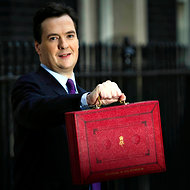 Toby Melville/ReutersA branch of the Co-operative Bank in London.
Toby Melville/ReutersA branch of the Co-operative Bank in London.
LONDON — Just as larger banks in Britain are recovering from the financial crisis, a smaller one championed by lawmakers as an alternative to institutions like Barclays and Royal Bank of Scotland is floundering, complicating the government’s plan to shake up the industry and testing its new regulatory system.
Much like the past troubles of its maligned larger rivals, the Co-operative Bank now has too many risky real estate loans and a buffer against losses that is too thin. Moody’s Investors Service cut its rating last week by six levels, to junk status, and said the bank might require “external support” if loan losses increased much more. The bank’s chief executive, Barry Tootell, resigned the next day.
The developments are an embarrassment for George Osborne, the chancellor of the Exchequer, who made it one of his goals to support the growth of smaller banks to improve the stability of the banking sector and increase competition. The government frowned upon the concentration of the market – the top five banks control 85 percent of the personal checking accounts – arguing that more competition would strengthen the sector.
In a speech in February, Mr. Osborne said he wanted “upstart challengers offering new and better services that shake up the established players.” He mentioned the Co-operative Bank by name, saying Britain had started to make some headway but that he wanted to see “more banks on the high street, so customers have more choice.”
In an industry that had cost the government billions of pounds to support throughout the financial crisis and had recently shocked clients with a string of scandals, the Co-operative Bank had enjoyed a relatively unscathed reputation.
Its structure also makes it stand out. The bank is the main subsidiary of the Co-operative Group, one of the largest cooperative businesses. It is owned by seven million members, mainly its employees and customers. Apart from the bank, the Co-operative Group also owns funeral services, pharmacies, food stores and farms.
Much of the government’s hope to expand the Co-operative Bank relied on the planned purchase of 632 branches that the Lloyds Banking Group had to sell to comply with European competition rules after receiving a government bailout in 2008. The purchase would have tripled the bank’s network to about 1,000 branches.
But the Co-operative Bank pulled out of the £750 million ($1.2 billion) deal in April, almost a year after agreeing on the terms, citing the economic environment and increasing regulatory requirements. Analysts said the bank had neither the financial strength nor the technological know-how to complete the transaction. A month earlier, the Bank of England had asked banks to raise a combined £25 billion before the end of the year to plug capital shortfalls.
“There could have been closer scrutiny,” said Simon Maughan, an analyst at Olivetree Securities. But he also said “there’s an irony: the government is insisting on higher capital, then having to go and help the banks as they’re trying to achieve that.”
The Co-operative Bank’s troubles stem mainly from a portfolio of commercial real estate assets that it inherited when it combined with the Britannia Building Society in 2009. Over the years, the bank put aside money to cover losses from bad loans, but not enough. In March, the bank shocked the market when it reported a loss of £674 million for 2012. Impairment charges more than quadrupled, to £469 million.
The bank’s core Tier 1 ratio, a measure of a bank’s ability to weather financial crises, is 6.7 percent, according to new stricter accounting rules known as Basel III. That is below the 7 percent target the Bank of England ordered British banks to achieve by the end of this year, Moody’s said.
The bank’s troubles are also the first serious test for Britain’s new regulatory system. Five years after the government had to bail out the Lloyds Banking Group and the Royal Bank of Scotland and was forced to privatize the mortgage lender Northern Rock, London overhauled the way it supervised banks, shifting more powers to the Bank of England. A spokesman for the Bank of England’s Prudential Regulation Authority, one of the new financial regulators, declined to comment on the Co-operative Bank, citing its policy not to comment on specific companies.
Ian Gordon, an analyst at Investec Securities, said it was “curious that the bank was allowed to run with such weak levels of capital,” adding there was “an element of regulatory neglect” that represented a lesson for the new system.
Julia Black, a professor at the London School of Economics, said, “Supervision isn’t a transparent process, but I’m surprised it hasn’t already been required to hive off the bad loans or to set aside more capital.”
The Co-operative Bank said it would not need a government bailout and was working with the regulator to improve its capital position, mainly through selling businesses and loan portfolios. The bank’s cooperative structure means it cannot sell equity to improve its capital buffer but must rely on selling assets and pooling capital from its profitable nonbanking businesses.
Some analysts suggest the Co-operative Group might be better off not owning a bank in the long run – and that Mr. Osborne might be better off looking elsewhere for a new banking champion.
Article source: http://dealbook.nytimes.com/2013/05/15/heralded-small-bank-in-britain-mirrors-troubles-of-larger-rivals/?partner=rss&emc=rss
